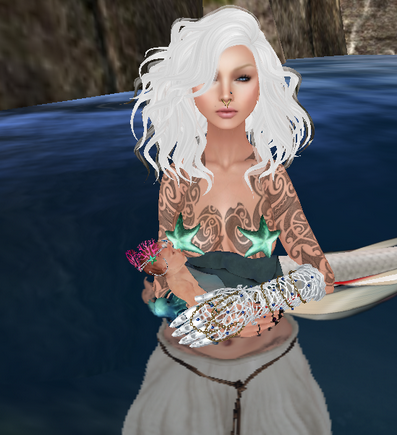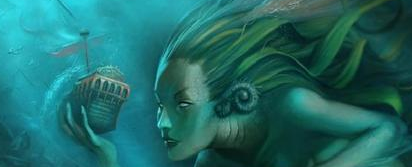Post by Anja Rosenthal on Jul 4, 2015 17:23:21 GMT -8
Some things within the Merfolk are rather standard. All Merfolk share certain aspects of their bodies, biology, and physiology that is unavoidable.
This is a guide to what ever Merfolk shares with every other.
Merfolk Biology & Physiology Standards
1. Eyes:
All Merfolk have a "Haw" or third eyelid. This is found in other animals within nature as a means to protect the eye from harmful debris in the water as well as the salt deposits in the ocean itself.
2. Gills:
Every Merfolk has a set of gills, be it on their necks, sides, or even sides of the face. Merfolk use these to filter oxygen from the water around them. Secondary gills are inside their humanoid noses within their head.
3. Tear Ducts:
All Merfolk are unable to cry. They simply don't require tear ducts when they spend 90% of their lives under water. As an evolutionary function, Merfolk simply don't need them and are not born without them.
4. Shifting:
All Merfolk in Valesk have the ability to take a legged form in some way or another (See Mainsite Merfolk Race Page For Details). This is a natural innate ability and defense mechanism. Should they remain on land too long, however, they will dry out and sicken or die.
5. Teeth:
Merfolk teeth are almost like those of a shark in that Merfolk can regrow teeth they lose or break.
6. Skin:
Merfolk skin is very sensitive to air above water. Their skin functions almost like that of a fish, and requires water to keep it hydrated and living. When a Merfolk is exposed to air for too long (more than 8 hours), they begin to dry out, their skin cracking and eventually dying and leading to the Mer's death as well.
7. Legs:
Merfolk spend most if not all of their lives within water. This is just their natural habitat. When a Merfolk takes land form, their legs are not as strong as their tail is. While Merfolk can best any creature in the water that is not of their race, they are not as fast or strong on legs.
8. Language:
Mermish is the native language, not Common (aka English). It is a beautiful, haunting language underwater, but sounds guttural and harsh when spoken outside water as it is not meant to be spoken on land.
9. Depth:
Merfolk are natural swimmers and divers, their body can withstand some pressures of the ocean that a normal humanoid cannot without aid. Merfolk can dive up to 150 feet down without problem. With aid of magic to help their lungs and body (basically pressurize), they can go to a depth of 200 feet.
10. Water:
Merfolk have the innate ability to live in either fresh water or salt water. While fresh water more often found in ponds and rivers can prove to be easy breathing, salt water is a Merfolk's natural habitat. Switching from salt water to fresh water or vice versa can take some getting used to and may cause the Merfolk to have a burning nose and a headache for a couple days, but otherwise it is something built into Merfolk biology.
11. Development:
Merfolk are born, not made (unless magically race changed with ADMIN approval & Rerolling).
Sirens cannot make sirens by biting someone. Merfolk cannot be made or created through any natural means.
Additionally, Merfolk develop at an accelerated rate while in the womb, and through their younger years. Merfolk development slows at the age of 3, and they then age normally till the age of 18 when they reach their sexual and biological maturity. After this stage, they begin to slow their rate of aging and come to a near stop. Lifespan is 1000.
More to come....
This is a guide to what ever Merfolk shares with every other.
Merfolk Biology & Physiology Standards
1. Eyes:
All Merfolk have a "Haw" or third eyelid. This is found in other animals within nature as a means to protect the eye from harmful debris in the water as well as the salt deposits in the ocean itself.
2. Gills:
Every Merfolk has a set of gills, be it on their necks, sides, or even sides of the face. Merfolk use these to filter oxygen from the water around them. Secondary gills are inside their humanoid noses within their head.
3. Tear Ducts:
All Merfolk are unable to cry. They simply don't require tear ducts when they spend 90% of their lives under water. As an evolutionary function, Merfolk simply don't need them and are not born without them.
4. Shifting:
All Merfolk in Valesk have the ability to take a legged form in some way or another (See Mainsite Merfolk Race Page For Details). This is a natural innate ability and defense mechanism. Should they remain on land too long, however, they will dry out and sicken or die.
5. Teeth:
Merfolk teeth are almost like those of a shark in that Merfolk can regrow teeth they lose or break.
6. Skin:
Merfolk skin is very sensitive to air above water. Their skin functions almost like that of a fish, and requires water to keep it hydrated and living. When a Merfolk is exposed to air for too long (more than 8 hours), they begin to dry out, their skin cracking and eventually dying and leading to the Mer's death as well.
7. Legs:
Merfolk spend most if not all of their lives within water. This is just their natural habitat. When a Merfolk takes land form, their legs are not as strong as their tail is. While Merfolk can best any creature in the water that is not of their race, they are not as fast or strong on legs.
8. Language:
Mermish is the native language, not Common (aka English). It is a beautiful, haunting language underwater, but sounds guttural and harsh when spoken outside water as it is not meant to be spoken on land.
9. Depth:
Merfolk are natural swimmers and divers, their body can withstand some pressures of the ocean that a normal humanoid cannot without aid. Merfolk can dive up to 150 feet down without problem. With aid of magic to help their lungs and body (basically pressurize), they can go to a depth of 200 feet.
10. Water:
Merfolk have the innate ability to live in either fresh water or salt water. While fresh water more often found in ponds and rivers can prove to be easy breathing, salt water is a Merfolk's natural habitat. Switching from salt water to fresh water or vice versa can take some getting used to and may cause the Merfolk to have a burning nose and a headache for a couple days, but otherwise it is something built into Merfolk biology.
11. Development:
Merfolk are born, not made (unless magically race changed with ADMIN approval & Rerolling).
Sirens cannot make sirens by biting someone. Merfolk cannot be made or created through any natural means.
Additionally, Merfolk develop at an accelerated rate while in the womb, and through their younger years. Merfolk development slows at the age of 3, and they then age normally till the age of 18 when they reach their sexual and biological maturity. After this stage, they begin to slow their rate of aging and come to a near stop. Lifespan is 1000.
More to come....






